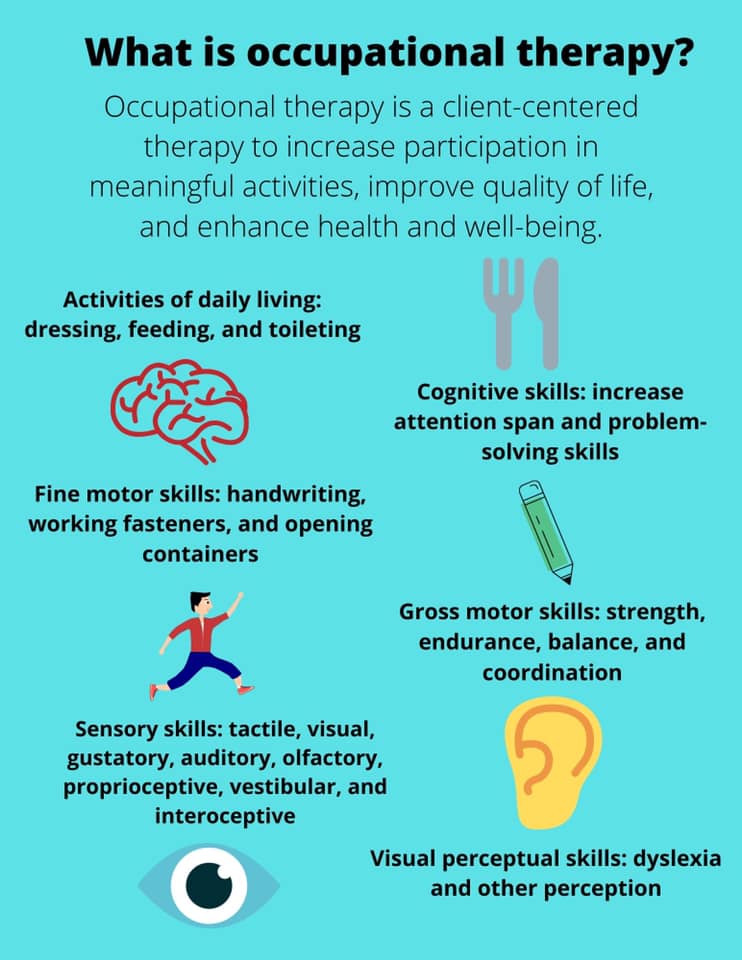Occupational therapy is a healthcare profession dedicated to empowering individuals of all ages to have meaningful engagement in their daily activities.
Did you know Occupational Therapy (OT) extends far beyond addressing physical limitations? OT practitioners are trained to address a wide range of challenges that individuals may face in their daily lives, including those related to mental health, emotional well-being, social participation, and cognitive function.
So let’s dive deeper into how OTs can improve your daily function and overall quality of life.

Coping with Mental Health Conditions with Occupational Therapy
Occupational therapists can assist clients in managing and coping with mental health conditions such as anxiety, depression, PTSD, sensory disorders, psychosocial dysfunction, mental illness, developmental (or learning) challenges, and more.
The role of occupational therapists when it comes to anxiety or other similar psychiatric disorders, is to find out the symptom-causing conditions or stimuli through assessment and then help the client to correct the behavior by providing different approaches. For more information on how Occupational therapy can help patients with anxiety, visit Occupational Therapy in Anxiety Disorder.
Here at Full Distance, our OTs assess each client holistically and then employ various techniques and interventions to help clients build coping skills, develop effective routines, and engage in meaningful activities that promote mental wellness.

Emotional Regulation and Occupational Therapy
OTs can work with individuals to enhance emotional regulation skills, including identifying and expressing emotions appropriately, managing stress, and improving self-awareness. Through therapeutic activities and discussions, OTs help clients develop strategies to navigate challenging emotions and situations.
Although our occupational therapists can’t remove everyday stresses from your life, they CAN provide tools to allow you to manage stress to participate more fully in your everyday life. These tools may include:
-Breathing Exercises
-Progressive Muscle Relaxation
-Guided Imagery
-Sensory Guidance
As mentioned in Progressive Muscle Relaxation for Stress and Insomnia, progressive muscle relaxation (PMR) is a deep relaxation technique that has been effectively used to control stress and anxiety, relieve insomnia, and reduce symptoms of certain types of chronic pain. PMR is based upon the simple practice of tensing, or tightening, one muscle group at a time followed by a relaxation phase with release of the tension. PMR can be easily learned and only requires 10 to 20 minutes per day to practice.
Our team at Full Distance prioritizes sharing the importance of mindfulness throughout your wellness journey. We encourage our clients to take the time to be in the moment and recognize their feelings. This can be done during breathing exercises, yoga, or even massage therapy.

Promoting Social Participation with Occupational Therapy
Occupational therapists play a crucial role in promoting social participation and interpersonal skills. They may facilitate social skills training, communication strategies, and community integration activities to help clients build and maintain relationships, engage in social interactions, and participate in meaningful social roles and activities.
Social awkwardness isn’t only a challenge for kids; adults can struggle with social skills too, which can cause anxiety and even phobias. Social skills training often begins when adults haven’t learned or been taught how to interact appropriately or have difficulty understanding social cues. These difficulties can also be linked to disorders like autism, which affect social development.
As discussed in further detail on Social Skills Training for Adults: 10 Best Activities: Clients can ask themselves some questions to determine if the social skills therapy process is right for them.
These questions can include:
What aspects of my life am I struggling with?
Are there specific social situations or skills that I struggle with?
Do I have trouble keeping or maintaining relationships with friends, family members, and coworkers?
Am I avoiding specific social situations out of fear?

Improving Cognitive Function with Occupational Therapy
Our OTs are skilled in addressing cognitive impairments and difficulties related to memory, attention, executive function, and problem-solving. They may implement cognitive rehabilitation techniques, memory aids, and compensatory strategies to improve cognitive function and support independent living. Our OTs are experienced with implementing different strategies related to dementia, Alzheimer’s, stroke, TBI, and others to assist with short-term memory and problem-solving difficulties.
An important goal is to function independently within the patient’s environment with modifications and strategies to assist with everyday activities.
According to Occupational Therapy To Improve Memory Loss, compensatory strategies may be used for individuals to learn specific methods and skills so they can offset areas of challenge. Here are some examples of compensatory strategies and reminders that can be helpful:
Make appointments and plans at the same time/day, and keep a calendar to review regularly
Keep your phone/wallet/keys/purse in the same place when not in use
Make lists and check off tasks/errands when completed
Take your time to avoid mistakes
Keep your tasks simple when possible, and focus on one at a time before moving on to another
If a task is complicated, break it down into several steps, and give yourself a time frame for completion
Organize medication in a pill box
Reduce the clutter, get rid of junk mail, and eliminate unnecessary paperwork to reduce stress
Rehearse new tasks over and over
Stick to a routine in the same order each day
Engage with family members that will encourage you to keep going
Talk about old memories with friends and loved ones
Discuss safety with your caregivers, and have them remove any items in the house that may cause you harm

Activities of Daily Living (ADLs) and Instrumental Activities of Daily Living (IADLs): OTs assist individuals in mastering essential daily tasks such as dressing, grooming, cooking, cleaning, and managing finances. They also help clients with more complex activities like grocery shopping, using transportation, and maintaining a household, enabling greater independence.
Our OT’s will assess each individual client’s ability to participate in essential, daily routine tasks and then determine a plan of care to ensure the client is safe. Performing an ADL assessment helps determine whether the client may require further rehabilitation or assistance at home or if a skilled nursing or long-term care facility would be a safer environment.
If it is determined that the client will benefit from receiving additional care, our OT will refer them to our Care-Coordination program, or a program that best suits the client. It is our mission at Full Distance to ensure we can be here for our clients through each step of their journey.

Our goal is to implement preventative and proactive measures to promote longevity while reducing client risk for injuries, falls, hospitalizations, social isolation, and caregiver burden. We strive to improve the quality of life for each and every client, regardless of their physical, mental, or emotional challenges.







